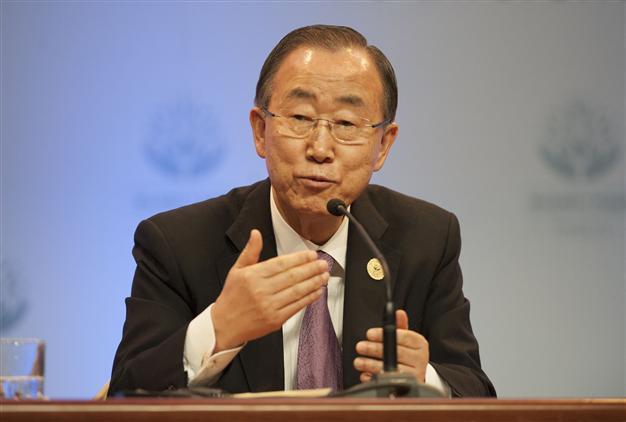UN chief Ban Ki-moon holds Baghdad talks
BAGHDAD - Agence France Presse

AFP Photo
United Nations Secretary General Ban Ki-moon arrived in Baghdad on March 30 for talks with Iraqi Prime Minister Haider al-Abadi and other top officials.Ban first met President Fuad Masum and Foreign Minister Ibrahim al-Jaafari and was also due to meet parliament speaker Salim al-Juburi before holding talks with Abadi.
The UN mission in Iraq announced Ban's arrival on Twitter but provided no details of the agenda of the talks.
Iraqi forces are battling to retake the city of Tikrit, the government's largest military operation yet against the Islamic State of Iraq and the Levant (ISIL).
The fact that Baghdad is receiving military assistance from both the United States and Iran however has created tensions, internally and internationally.
Ban flew in from Egypt, where he attended an Arab League summit in Sharm el-Sheikh dominated by Saudi-led military action against Yemen's Huthi Shiite rebels.
He is expected to travel on to Kuwait for a meeting of international donors on Tuesday called to address a massive funding gap in the response to the conflict in Syria.
Ban's new special representative Jan Kubis, a diplomat from Slovakia, arrived in Baghdad on Friday to take over from Bulgaria's Nickolay Mladenov.
The UN office of the commissioner for human rights issued a report in March saying that ISIL jihadists may have committed war crimes, crimes against humanity and genocide in Iraq.
Jihadist fighters swept through much of Iraq's Sunni Arab heartland in June, carrying out mass executions, targeting minorities, and abducting women and children.
The report also found that Iraqi forces and allied militias "carried out extrajudicial killings, torture, abductions and forcibly displaced a large number of people, often with impunity."
Human Rights Watch expressed regret that a resolution adopted by the UN Human Rights Council on Friday only denounced atrocities committed by ISIL.
"With military operations in Tikrit under way, the council missed a crucial opportunity to send a strong signal to Iraq and its allies to take all necessary steps to end abuses by militias and security forces," the watchdog said.
The Iraqi government has received support from Iran and from a US-led coalition of 60 nations, some of which are carrying out air strikes.
The UN's cultural agency has been active in attempting to salvage heritage threatened by ISIL in both Iraq and Syria.
UNESCO director Irina Bokova visited Baghdad on Saturday to announce several initiatives aimed at boosting protection measures and raising awareness.
















